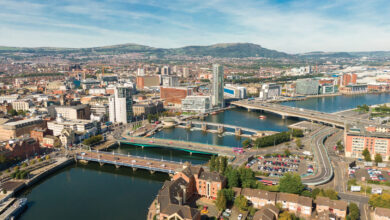The Northern Ireland CEO in a changing world


Business leaders in Northern Ireland face a mixed bag of both potentially positive and negative items on the board agenda. At one level, our exports are competitively priced, product quality is widely acknowledged and the exchange rate is favourable. However, margins are tight and there is intense competition in every sector. Inevitably, the spectre of Brexit looms over many business decisions and there is a long way to go before we have any clear idea of what a final deal may look like, writes Johnny Hanna, Head of Tax with KPMG in Northern Ireland.
Meanwhile, the pace of change in the wider world has meant that CEOs and their teams are dealing with challenges that in many cases they have no prior career experience of. These range from issues such as cyber security to massive technological disruption creating risk in every sector. All of these issues are taking place against a backdrop of major geopolitical change impacting on business attitudes not just in Northern Ireland but indeed globally.
These themes are the focus of our most recent Northern Ireland CEO Outlook entitled ‘Disrupt and Grow’. Conducted both here and worldwide on our behalf by Forbes, it measures sentiment amongst business leaders in a range of markets. It provides perspectives around the new waves of uncertainty that are compelling our CEOs to think in fresh ways about the disruptive forces impacting their businesses. These include increasing risks and opportunities provided by technology and the continuing uncertainty caused by Brexit.
In macroeconomic terms, Northern Ireland CEOs are less confident about growth prospects for the global economy over the next three years, but are more confident when it comes to the growth prospects for Northern Ireland, their own companies and the sector in which they operate. This sentiment is very much in keeping with their peers worldwide whereby business leaders tend to show greater optimism about areas that they may feel they have either more knowledge about (such as their sector) or more control over (the business that they lead).
Our survey also shows that both at home and abroad, companies leading the market are those taking the necessary steps for their business to be a disruptor rather than disrupted. They see disruption as an opportunity to transform their business model, develop new products and re-shape their business.
Political uncertainty
80 per cent of Northern Ireland CEOs surveyed agree or strongly agree that political uncertainty is having a greater impact on their businesses than previously seen. These figures are higher in Northern Ireland than in many markets and may reflect Brexit related uncertainty as well as the challenges faced by the lack of a functioning administration at Stormont. All Northern Ireland respondents said they are ramping up their scenario planning to plot a course through uncertain waters, with almost two thirds (63 per cent) planning on recruiting new skills/specialists into their management team to better understand geopolitical risk.
These risks are exemplified locally by Brexit. At the time of writing, the UK government has issued its paper outlining its intention to avoid a hard border between Northern Ireland and the Republic of Ireland. Whilst we are a long way from seeing a final outcome, there is a real need to minimise any negative impact on cross-border trade which has doubled since 1995. Notwithstanding the hugely significant trade between Northern Ireland and Britain, it is also worth noting that 56 per cent of Northern Ireland’s goods and services exports go to the EU – with two thirds of that heading across the border.
In Brexit-related discussions with various business leaders, we emphasise the need to consider all scenarios – in particular the UK Government’s stated intention to leave both the single market and the customs union. We recommend focussing on the business implications, for example, understanding supply chain implications and the origin of inputs. These discussions are but one example of where geopolitics, technology and the pace of change are combining to create new and challenging issues for CEOs to manage. Whilst Northern Ireland CEOs have some specific local issues to consider, they can also be assured that their peers worldwide are also facing new, and in many cases, unique challenges and opportunities. Find out more at www.kpmg.ie.
Johnny Hanna
Head of Tax, KPMG in Northern Ireland
T: 028 9024 3377
E: johnny.hanna@kpmg.ie






